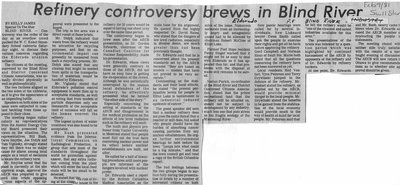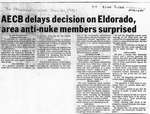Refinery Controversy Brews In Blind River - The Sault Star, 1981
- Full Text
Refinery Controversy Brews In Blind River
BY KELLY JAMES
Special To The Star
BLIND RIVER -
Controversy was the order of the day as an overflow crowd packed the W. C. Eaket Secondary School cafeteria Saturday night, to discuss their various concerns regarding the Eldorado uranium refinery.
The citizens at the meeting, convened by the Blind River and District Concerned Citizens Associations, was actually divided physically as well as philosophically.
The two factions aligned on the two sides of the cafeteria, as if to give the appearance of an impending battle.
Speakers on both sides of the issue were subjected to constant heckling from those opposed to their ideas.
The meeting began rather calmly as representatives from the Atomic Energy Control Board presented their views on the situation. The representatives, Bill Bush, Dave Smythe, Joe Didyk and Tom Viglasky, strongly stated they felt there was no major cause for alarm among local people as a result of decisions to locate the refinery here.
Mr. Smythe noted that the plant is currently at the site approval stage, approval the AECB was prepared to give until nine briefs opposing -ious aspects of the approval were presented to the board.
The trip to the area was a direct result of those briefs.
Mr. Didyk indicated that waste from the refinery would be attractive for recycling purposes, and that no environmental impact can presently be measured from such a recycling process. Mr. Didyk also stated that any cleanup that might be needed from spills in the transportation of materials would be handled by Eldorado.
Mr. Viglasky stated that Eldorado's pollution control equipment is more than up to acceptable standards, as well as noting that from models of particle dispersion only one thousandth of the acceptable limit of emission will fall on the homes nearest the refinery.
The lagoon system of water treatment was also found to be acceptable.
Mr. Bush presented evidence from the International Commission on Radiological Protection, a group that sets most of the standards throughout the world for protection against cancer, that any extra radiation coming from the plant which will enter the local food chain will be too small to be detected
He stated that the risk of living at the closest house to the refinery for 25 years would be equal to having one chest xray over the same time period.
The controversy began to brew soon after the AECB presentation, as Dr. Gordon Edwards, chairman of the Canadian Coalition for Nuclear Responsibility, made his presentation.
Dr. Edwards, whose views were generally contrary to those of the AECB, did not have an easy time in getting the co-operation of the crowd. Although he was periodically interrupted by the zealous local defenders of the refinery, he effectively presented what he termed "the other side of the story." Especially concerning the setting of standards of the AECB and disagreement in the medical profession on the effects of low level radiation such as the refinery will emit.
The math and physics professor from Vanler University in Montreal stated that people must find out the true facts concerning nuclear power and its effect before nuclear establishments are built, not after.
He called for a halt of licencing procedures until more people are informed of the dangers involved with nuclear power.
Dr. Edwards used a report by the British Columbia Medical Association as the main base for his argument. He quoted from the highly respected Dr. David Bates, who stated that the dangers of low level radiation, especially in diverse doses, are much greater than had been previously thought.
Dr. Edwards said that he is concerned about the present standards set by the AECB because "they are based on models — models that have not proved to be very accurate."
Commenting on the standards and their local effects, he stated "the present permissible levels for people in Elliot Lake is tantamount to an industrial induced epidemic of cancer."
The guest speaker did note that a nuclear refinery does not pose the same threat that a reactor or mill does, but asked why people should have the burden of absorbing cancer causing particles from any nuclear establishment. He urged further environmental hearings be held before the town "jumps into what could be a big mistake," and that the town council get and read a copy of the British Columbia report.
The bad feelings between the two groups began to surface fully during the presentation of briefs by a number of interested citizens on both sides of the issue. Numerous outbursts from an increasingly angry and antagonistic crowd had to be silenced by chairman Robert McCrae of Elliot Lake.
Former Port Hope resident Penny Singer warned that it might not be as easy to deal with Eldorado as it has appeared thus far, and that problems with the disposal of waste still remains to be solved.
Norlan Purich, co-ordinator of the Blind River and District Concerned Citizens Association, stated that the prime recreational land that the refinery will be situated on, should not be subject to development by any industry, much less one that puts stress on the fragile ecology of the Mississaugi River.
New public hearings were called for by several individuals. New Liskeard lawyer Owen Smith called upon the people to exercise their rights and get all he facts before approving the refinery. Gord Campbell and Norman Sloan of Sault Ste. Marie both noted that all the questions concerning the refinery have not been answered as yet.
Local residents Red Venturi, Vern Peterson and Terry Grywinski jumped to the defence of the refinery. Mr. Venturi stated the refinery, as pointed out by the AECB, would provide minimal danger to the local people. Mr. Grywinski stated the benefits to be gained from the stablization of the local economy would provide much in the way of health of mind for local people. Mr. Peterson said that he felt the refinery would be "one of the cleanest and safest industries available for this area."
The presentations of the briefs was followed by a question period which was highlighted by continued harassment of the AECB by opponents of the refinery and of Dr. Edwards by refinery backers.
At one point, Dr. Edwards and Mr. Bush, nearly came t blows when Dr. Edwards accused the AECB member of misleading the people in statements.
The meeting closed with neither side truly satisfies with the results of a hard fought evening of discussion. The AECB will now return to Ottawa to give recommendations as to whether site approval should be given.
- Creator
- Kelly James, Author
- Media Type
- Text
- Item Type
- Clippings
- Description
- The controversy was constant in the days prior to the building of Eldorado in Blind River. Many concerned citizens for and against attended meetings with members of the AECB to discuss the pros and cons the plant might present. This article discusses one such meeting convened by the Blind River and District Concerned Citizens Association.
- Publisher
- The Sault Star
- Place of Publication
- Sault Ste Marie, on
- Date of Original
- February 9, 1981
- Subject(s)
- Collection
- Blind River History
- Language of Item
- English
- Geographic Coverage
-
-
Ontario, Canada
Latitude: 46.18336 Longitude: -82.95817
-
- Copyright Statement
- Protected by copyright: Uses other than research or private study require the permission of the rightsholder(s). Responsibility for obtaining permissions and for any use rests exclusively with the user.
- Contact
- Blind River Public LibraryEmail:brpl.ceo@gmail.com
Website:
Agency street/mail address:8 Woodward Avenue
P.O. Box 880
Blind River, ON P0R 1B0
(705) 356-7616



